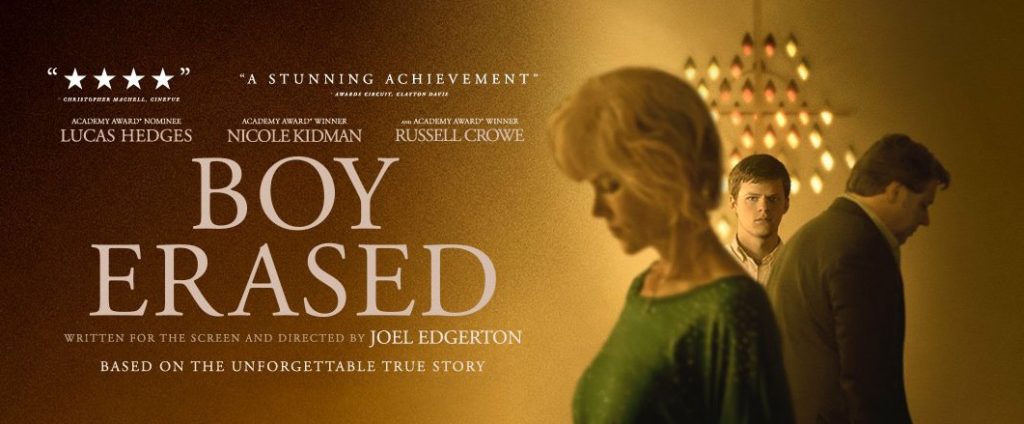There are many in this world who continue to believe that homosexuality is an abomination and a sin in the eyes of God. While I don’t believe it’s my place or anyone else’s for that matter, to ever try forcing any of them to see it differently, the same can’t often be said for them, especially when one of them is also a parent facing a child’s struggle with sexuality. As many of those parents frequently resort to sending their child off to gay conversion therapy programs with the sole hope it will remove the part of them that’s gay. This is the very premise of an eye-opening movie I recently saw in theaters titled “Boy Erased”.
Based upon a true story from Garrard Conley’s 2016 memoir of the same name, the film follows the life of Jared Eamons (Lucas Hedges), who is the son of a Baptist preacher, Marshall (Russell Crowe) and a Baptist mother, Nancy (Nicole Kidman). When a disturbing sexual event from his life catches up with him, Jared is directly confronted by his father and asked if “IT’S” true. When Jared finally admits his deepest, darkest secret to his parents, that he thinks of men, his father becomes immediately disturbed, so much so that he consults a few other pastors for help, both of which convince him to send his son off to a gay conversion therapy program. Once there, Jared witnesses the truth and many horrors of the program at the hands of chief therapist Victor Sykes (Joel Edgerton), including physical abuse, mental torture, shaming, and intimidation. While some remain in the program and privately admit they are just “playing the part”, others desperately try to remove the piece of themselves they’re constantly told is a disgrace to God. It is there where Jared will ultimately face himself and decide once and for all, is he truly gay and going to accept that’s how God made him, or is his thoughts of men really just some sick part of himself?
Sadly, some 700,000 children have been sent off to gay conversation therapy programs just like the one Jared Eamons took part in, many of whom became psychology worse because of it with some even eventually resorting to suicide, all to escape the pain inflicted upon them by both their families and the “therapy” forced upon them.
While my parents never attempted to force gay conversion therapy programs upon me, I have experienced first-hand quite a few ultra-conservative religious folks over the years attempting something similar. I’ve been repeatedly warned by them I’d never make it into Heaven if I remained a “practicing homosexual”. I’ve been informed by them my sexuality is a choice and that God didn’t create me in this way. I’ve been rejected from membership from a number of prominent churches in the process as well. And I’ve even in recent years been advised that my long-enduring health issues are nothing more than a punishment from God for being gay. After watching “Boy Erased”, I was actually grateful that the brain-washing attempts upon me over the years by ultra-conservatives wasn’t anything even close to what Jared Eamons went through.
What I found most sad about these types of programs after watching the film and reflecting upon my own personal experiences with those who attempted to “convert” me into what they believed was the only God-given way, is how many in this world have ended up permanently turning away from God because of it all. Far too many gay people I’ve met over the years seem to care less about God, all because of the constant message they’ve received that God hates gays.
Ultimately, I believe I was born gay and that God made me this way. I don’t believe God made a mistake with me, or anyone else for that matter, especially when it comes to one’s sexuality. And I wholeheartedly don’t believe that God called me to live a life of either celibacy or a life in a relationship with a woman I don’t have true feelings for. To arrive at this place of acceptance with myself and my sexuality took experiencing many moments of stillness in meditation and prayer. God eventually did answer, many years ago, leading me to understand that whomever I entered a relationship with, man or woman, I was only to love them with all my heart, mind, and soul, and that’s all that mattered.
Unfortunately, much of the world still believes otherwise and continues to send questioning youths and even adults off to places like gay conversion therapies or worse. The fact is, until everyone comes to realize that God loves and accepts everyone, regardless of their sexuality, and that a person’s sexuality is for them to decide and no one else, more and more people are going to feel rejected by God by the actions of ultra-religious conservatives forced upon them.
Thankfully, Jared Eamons survived what was forced upon him and was able to go on to share his story with the world in both a memoir and now a movie that is extremely eye-opening to the truths and many horrors of gay conversion therapies, so much so that I know I’ll be praying for some time to come for anyone who ever has had to endure them…
Peace, love, light, and joy,
Andrew Arthur Dawson



